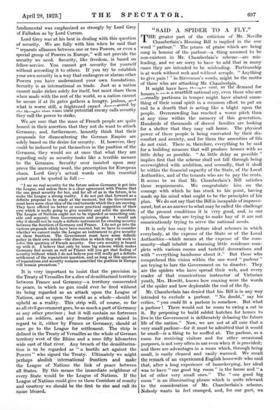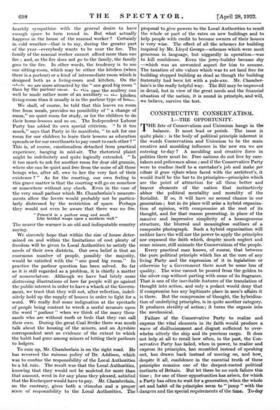"SAID A SPIDER TO A FLY." , T HE greater part of
the criticism of Mr. Neville Chamberlain's Housing Bill is implied in the one word " parlour." The preens of praise which are being sung in honour of the parlour—a thing assumed to be non-existent in Mr. Chamberlain's scheme—are mis- leading, and we are sorry to have to add that in many cases they are intended to be misleading. Partisanship is at work without reck and without scruple. " Anything to give pain ! " in Stevenson's words, might be the motto of those who are attacking Mr. Chamberlain. . It might have been Luta, as the 'demand for houses ;‘, neartfelt national cry, even those who are ...,rurally partisans in temper might have abated some- thing of their usual spirit in a common effort to put an end to a dearth that is acting like a blight upon the people. Overcrowding has reached a worse pitch than at any time within the memory of this generation. Hundreds of thousands of decent families are looking for a shelter that they may call home. The physical power of these people is being enervated by their dis- comfort and anxiety, and for them the amenities of life do not exist. There is, therefore, everything to be said for a building measure that will produce houses with as little delay as possible. " As little delay as possible " implies first that the scheme shall not fall through being overweighted with ambition, and secondly, that it shall be within the financial capacity of the State, of the Local Authorities, and of the tenants who are to pay the rents. It seems to us that Mr. Chamberlain's Bill satisfies these requirements. We congratulate him on the courage with which he has stuck to his point, having made up his mind what ought to be the principles of his plan. We do not say that the Bill is incapable of improve- ment, but as an answer to what may be called the challenge of the present conditions it is very good, and, in our opinion, those who are trying to make hay of it are not conscientiously trying to serve the national needs.
It is only too easy to picture ideal schemes in which everybody, at the expense of the State or of the Local Authorities—which means at the expense of the com- munity—shall inhabit a charming little residence com- plete with various rooms and tasteful decorations and with " everything handsome about it." But those who comprehend this vision within the one word " parlour " are trying to lure the Government on to disaster. They are the spiders who have spread their web, and every reader of that conscientious instructor of Victorian youth, Mrs. Howitt, knows how coaxing were the words of the spider and how deplorable the end of the fly.
Mr. Chamberlain has denied that his Bill is in any way intended to exclude a parlour. " No doubt," say his critics, " you could fit a parlour in somehow. But what a parlour There would not be room to swing a cat in it. By proposing to build rabbit hutches for heroes to live in the Government is deliberately debasing the future life of the nation." Now, we are not at all sure that a very small parlour—for it must be admitted that it would be small—is a thing to be scoffed at. The parlour, as a room for receiving visitors and for other occasional purposes, is not very often in use even when it is provided: and there are advantages in a room which, through being small, is easily cleaned and easily warmed. We recall the remark of an experienced English housewife who said that, after a long experience of housekeeping, her ideal was to have " one good big room " in the house and " a lot of other very small ones." The " one good big room " is an illuminating phrase which is quite relevant to the consideration of Mr. Chamberlain's scheme. Nobody wants to feel cramped, and, for our part, we heartily sympathize with the general desire to have enough space to turn round in. But what actually _happens in the house of the manual worker ? Certainly in cold weather—that is to say, during the greater part of the year—everybody wants to be near the fire. The 'family of the manual worker cannot afford more than one fire ; and, as the fire does not go to the family, the family goes to the fire. In other words, the tendency is to use one sitting-room, which may be either the kitchen (-when :there is a parlour) or a kind of intermediate room which is designed both as a living-room and kitchen. On the -ink. we are more attracted by the " one good big room " than by the parlour iov.a. fliis case the scullery can well be made rather more of an auxiliary kitchen (living-room than it usually is in the parlour type of We shall, of course, be told that this leaves no room =free from meals, provides no possibility of " a change of room," no quiet room for study, or for the children to do their home-lessons and so on. The Independent Labour 'Party has added its own special criticism. " Is it too much," says that Party in its manifesto, " to ask for one -room for our children to learn their lessons as education spreads or for our sweethearts to pay court to each other ? " This is, of course, emotionalism detached from practical experience, hanging in mid-air. The rhetorical plaint might be indefinitely and quite logically extended. " Is 'it too much to ask for another room for dear old grannie, where she can be quiet and free from the noise of all those beings who, after all, owe to her the very fact of their existence ? " As for the courting, our own feeling in this grave matter is that the courting will go on somehow or somewhere without any • check. Even in the case of the very small parlour which Mr. Chamberlain's measure- ments allow the lovers would probably not be particu- larly distressed by the restriction of space. Perhaps 'they would not even be aware that there was no fire.
" Prison'd in a parlour snug and small, Like bottled wasps upon a southern wall."
The nearer the warmer is an old and indisputable country saying.
We sincerely hope that within the size of house deter- .mined on and within the limitations of cost plenty of .freedom will be given to Local Authorities to satisfy the needs of their own districts. Our own belief is that an gnormous number of people, possibly the majority, would be satisfied with the " one good big room." In practice the parlour question has been solved. So far as it is still regarded as a problem, it is chiefly .a -matter of nomenclature. Although we have had lately ,some :distressing illustrations of how far people will go _against the public interest in order to have a whack at the Govern- =era, we trust that they will not, after reflection, indefi- .nitely hold up the supply of houses in order to fight for a word. We really feel some indignation at the spectacle of people being content to wreck a useful measure upon ,the word " parlour " -when we think of the many thow- sands who are without roofs or beds that they can call their own. During the great Coal Strike there was much talk about the housing of the miners, and -an Ayrshire correspondent sent us evidence of the extent to which the habit had gone. among miners of letting their, parlours to lodgers.
- To sum up, Mr. Chamberlain is on the right road. He has reversed the ruinous policy of Dr. Addison, which: was to confine the responsibility of the Local. Authorities to a ld. rate. The result was that the Local Authorities, knowing that they would not be mulcted .for. more than that amount, went in for any plans they pleased, satisfied that the Exchequer would have to pay. Mr. Chamberlain,: on the contrary, gives both a stimulus and a proper sense of responsibility to the Local Authorities. The proposal to give powers to the Local Authorities to remit the whole or part of the rates on new buildings and to help people with credit to became owners of their houses is very wise. The effect of all the schemes .for building inspired by Mr. Lloyd George—schemes which were most generous in language, but niggardly in operation—was to kill confidence. Even the jerry-builder became shy —which -was an unwonted aspect for him to assume. The taxation of site values which was to set land free for building stopped building as dead as though the building fraternity had been hit with a pole-axe. Mr. Chamber- lain's is the really helpful way. The Bill may be improved in detail, but in view of the great needs and the financial situation of the .nation, it is sound-in principle, and will, we believe, survive the test.



















































 Previous page
Previous page